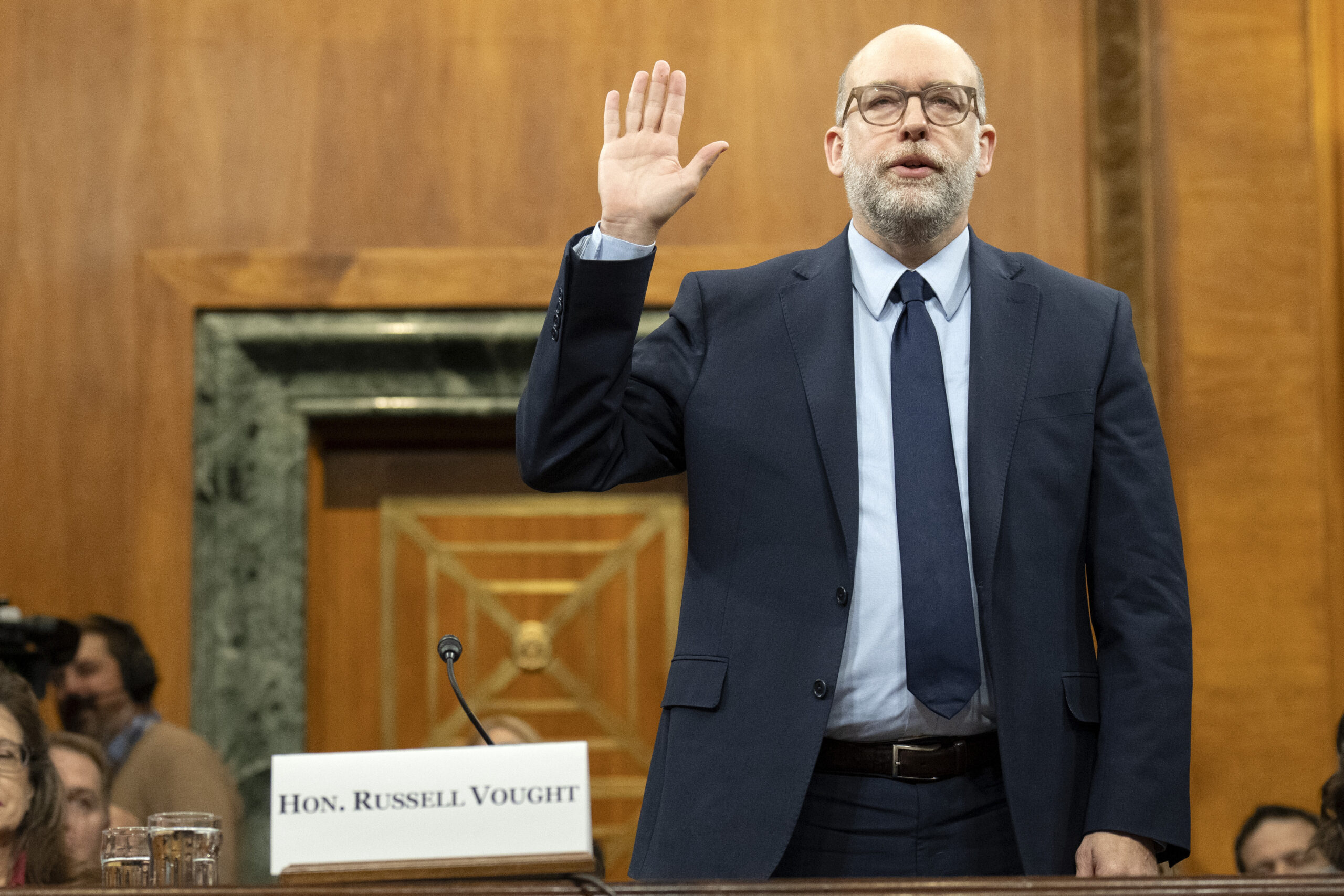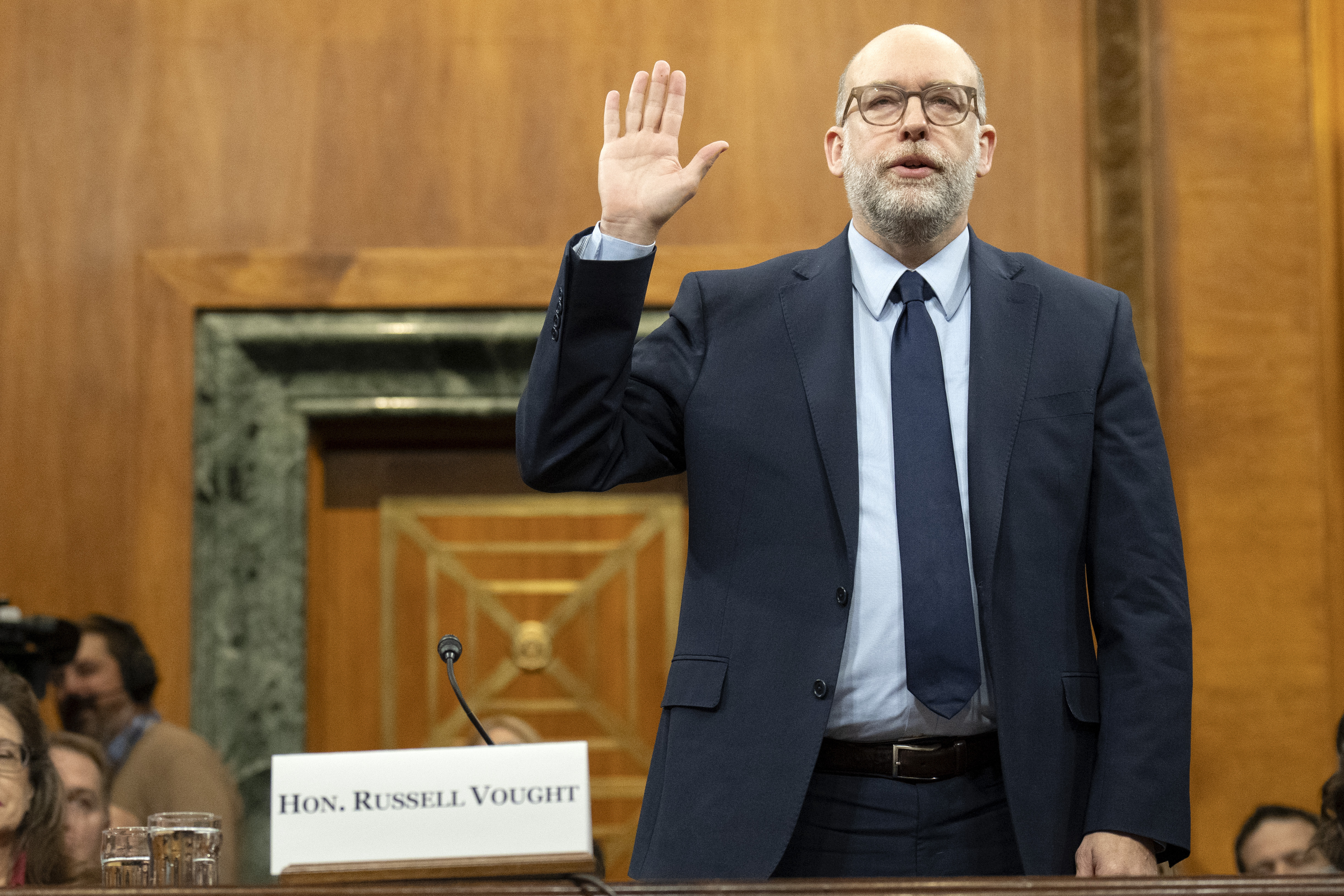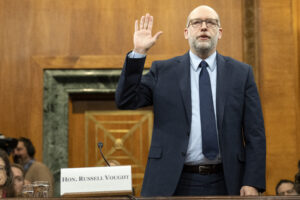Congress
Thune faces first loyalty test: What to do with Trump’s most controversial Cabinet picks
A series of controversial Cabinet picks have become an early test for how Senate leader-in-waiting John Thune will balance proving his loyalty to Donald Trump with the interests of his wide-ranging conference.
So far, he seems to be giving the president-elect wide deference.
Trump hasn’t finished his selections yet, but three picks for some of the most influential roles in the Cabinet are already prompting anxiety among GOP senators who must decide whether to confirm them: Matt Gaetz for attorney general, Pete Hegseth for secretary of Defense and Tulsi Gabbard for director of national intelligence. And Blue Light News first reported another pick Thursday afternoon: Robert F. Kennedy Jr. for Health and Human Services secretary.
Broadly, Republican senators, led by Thune (R-S.D.), say Trump should be allowed to fill out his Cabinet the way he wants — though a couple are openly expressing doubts, especially on Gaetz. Nominees can only afford to lose three votes on the Senate floor and still get confirmed.
“We don’t know until we start the process,” Thune said about Gaetz’s chances of getting confirmed. “And that’s what we intend to do with him and all the other potential nominees.”
The wait-and-see approach isn’t a ringing endorsement, and Thune will have his work cut out for him if he moves forward on confirming each nominee. In addition to publicly aired doubts from Sens. Susan Collins of Maine and Lisa Murkowski of Alaska, Sen. John Cornyn (R-Texas) said Thursday he wanted to see a House Ethics Committee report on Gaetz that details an investigation into several allegations against the attorney general nominee, including that he had sex with a minor. The chair of that panel has indicated the report won’t be released now, because Gaetz resigned from the House on Wednesday night.
The Department of Justice conducted its own investigation as part of a sex trafficking probe and, according to Gaetz’s lawyers and DOJ officials, decided not to bring criminal charges. Gaetz has denied any wrongdoing.
There are issues with Hegseth, Gabbard and Kennedy, too. Combat veteran Sen. Joni Ernst (R-Iowa) has said Hegseth needs to “explain” his recent comments on a podcast that “we should not have women in combat roles.” Gabbard has sparked concern within the intelligence community due to her sympathetic views on autocrats like Russia’s Vladimir Putin and Syria’s Bashar al-Assad. And some senators have dodged questions about confirming Kennedy — who has touted for years the debunked claim that vaccines cause autism — before reports of his official pick.
There’s a general theory on Senate-confirmed nominations that new presidents will offer a sort of sacrificial lamb, a nominee meant to go down to make others look better or provide cover to purple-state senators to approve others. But GOP leaders said they don’t think that’s Trump’s intention here, and regardless, more than one failure could sour Thune and Trump’s relationship early in the term. Thune has vowed to advance Trump’s agenda, and his nominees are the first test on how effectively he can deliver.
“He’s got a hard job,” said one GOP senator, granted anonymity to speak candidly. “Be careful what you ask for. He knew it was going to be hard. He knew President Trump was going to put people in there that people [were] going to question.”
But, the senator noted, Thune remains responsible for getting members “on the same page, and that’s tough as Republicans.”
Compare it to 2017, when Republican senators had a slightly slimmer majority to confirm Trump’s picks in his first term. At the time, Trump had to withdraw his secretary of Labor nominee Andrew Puzder after it became clear he didn’t have the votes in a 52-48 Senate majority. Puzder faced multiple accusations of misconduct, most notably his admission that he did not pay taxes on the services of an undocumented immigrant who worked for him for years.
Puzder was the only Cabinet nominee that Trump had to pull in his first year, though he was far from alone over the four-year term. Senate Republicans, even those closely aligned with Trump, aren’t eager to hop into another bruising series of confirmation fights — or deal with cascading withdrawals again.
And in a further sign of the general levels of deference to Trump, leading GOP senators aren’t actively pushing back on suggestions that the president-elect use recess appointments for picks that may not have the votes in the Senate.
Sen. Shelley Moore Capito (R-W.Va.) said she doesn’t think there’s been “any serious discussions on how to move forward on a recess appointment, because hopefully it’ll prove unnecessary.”
Republicans frequently brushed off questions about confirming the controversial nominees by pointing to the need for a thorough vetting process. And some argued that even if that process turned up negative information on nominees, it was in Trump’s best interest to find out before they were confirmed.
“We need to have a complete vetting of the nominees — not only so we know that the nominee is qualified but also to protect the president,” Cornyn said. “I’m sure it’s not in his best interest to have any surprises.”
“I don’t have any preconceived notions about it,” Cornyn later added about Kennedy’s planned nomination to HHS. But he said he’s “sure” Kennedy’s strong anti-vaccine position “will come up.”
With regards to Gabbard, Sen. Lindsey Graham (R-S.C.) — a close Trump ally — noted that “we have different foreign policy positions at times” but that he intended to give broad latitude to the president-elect in selecting his government.
“I’m gonna do with Trump what I do with everybody: Let you pick your people,” he told Blue Light News. “Defer to your choice, unless it’s too far.”
Collins, who voted against multiple Trump nominees in his first term, said she “can’t imagine” that the issues contained in the House Ethics Committee’s report about Gaetz wouldn’t “become public, either through the committee’s extensive investigation or the FBI report or questions asked by committee members at Mr. Gaetz hearing.”
“Mr. Gaetz is an example of where the Senate’s role is critical to take a look at allegations and at his fitness for a very important job,” Collins added.
And Murkowski, after saying Wednesday that Gaetz was not a “serious” pick, declined to weigh in on Trump’s selections on Thursday, saying she needs to meet with her constituents.
Sen. Todd Young (R-Ind.), who’s broken with Trump on occasion, said he needed to learn more about each of the picks, especially Gaetz.
“I don’t know enough to be concerned right now,” he told reporters. “I think it would be responsible for me to learn more about each of these nominees.”
Others in the conference said nothing, even an adverse report from the House Ethics Committee, would shake their confidence and willingness to confirm Gaetz as attorney general.
“He’s very talented, and anyone who has spent any time with him knows he’s very smart and capable. I’m going to vote to confirm him,” said Sen.-elect Jim Banks (R-Ind.). “I’m not gonna speculate about what [the Ethics report] says or what it doesn’t say, because we don’t know what it says.”
Joe Gould contributed to this report.
Congress
Fetterman says he’ll oppose Gabbard, RFK Jr.
Sen. John Fetterman (D-Pa.), who has been willing to buck his party to confirm some of President Donald Trump’s Cabinet picks, is ruling out voting for two of the president’s most controversial nominees: Tulsi Gabbard and Robert F. Kennedy Jr.
Fetterman said in a post on X Thursday night that he won’t vote to confirm Gabbard as director of national intelligence or Kennedy as secretary of the Department of Health and Human Services. Both are now expected to be confirmed after their nominations had been seen to be in jeopardy.
“I have met with most of the cabinet nominees and have carefully watched their confirmation hearings,” Fetterman wrote. “After considering what’s at stake, I have voted against moving forward to the confirmation of Ms. Gabbard and Mr. Kennedy, and will be voting NO on their confirmations.”
Fetterman was the lone Democrat to vote to confirm Pam Bondi as Trump’s attorney general, was one of two Democrats to vote to confirm Scott Turner as Secretary of Housing and Urban Development and was the sole Democrat to cast a committee vote advancing billionaire Howard Lutnick’s nomination to lead the Commerce Department.
A potential 2028 presidential candidate, Fetterman met with Donald Trump earlier this year and has sought to differentiate himself from the Democratic party brand after a bruising election.
Congress
Russ Vought confirmed as White House budget chief

The Senate has confirmed President Donald Trump’s pick to lead the White House budget office despite Democrats delivering a marathon of speeches condemning the administration’s vision for slashing the federal government.
Lawmakers voted 53-47 Thursday evening to return Russ Vought for a second tour as director of the Office of Management and Budget. Republicans were in lockstep behind the man who could dramatically alter how federal dollars get spent, in part by taking the “power of the purse” away from members of Congress.
Democrats all voted against Vought, but it wasn’t enough. It had been clear for days that the GOP majority was united behind Trump’s pick for OMB director, even as the agency rocked Congress last week with an attempt to freeze congressionally approved funds.
But even with Vought’s path to confirmation clear, Democrats were under pressure from their party base to push back against Trump and his nominees in any way they could. While they couldn’t prevent the inevitable, they at least could slow it down by refusing to yield back 30 hours in procedural time that would have otherwise allowed for a more expedient vote.
They ultimately slow-walked proceedings up until the very end. As each Democratic senator cast their vote, they stood by their desk in the chamber and named a program or project in their state that may be impacted by OMB’s attempted freeze of federal funds.
It was the culmination of their first such protest of the second Trump administration. The previous afternoon, Democrats launched what became an all-nighter, providing programming on the Senate floor into the early hours of Thursday morning and throughout the day.
“Why doesn’t government run like a business?” asked Sen. Brian Schatz (D-Hawaii) in one floor speech. “Let me tell you why: because if you ran government like a business, you would shut down every rural hospital.”
Schatz, who was referring to a mantra of conservative budget hawks and the tech billionaire Elon Musk who has gained massive influence over executive branch decision-making, took multiple shifts on the floor over a 30-hour period — sometimes solo, sometimes in a buddy-act with Sen. Chris Murphy (D-Conn.). Senate Minority Leader Chuck Schumer (D-N.Y.) was also a frequent presence.

This was not a real talking filibuster, where one lawmaker must hold the floor for hours without rest in order to grind proceedings to a total halt. This 30-hour time clock would have expired whether or not anyone gave speeches.
But Democrats’ commitment to filling the time with anti-Vought rhetoric — not reading children’s books or other off-topic bloviating — was their attempt to amplify a message they have sustained since last year’s campaigns: that the Heritage Foundation’s Project 2025 blueprint for Trump’s second term is a dangerous threat to democracy.
Vought authored a chapter on the “Executive Office of the President” in the Project 2025 document.
“Russell Vought and Donald Trump think they may be above the law,” Sen. Richard Blumenthal (D-Conn.) said Wednesday during his speaking turn.
Even before their speech-a-thon, Democrats made two attempts at the committee level to show how serious they were about their disapproval of Vought. Senate Homeland Security and Governmental Affairs Committee Democrats voted against him in committee on Inauguration Day. Senate Budget Committee Democrats later boycotted their panel’s vote on the nomination.
Senate Democrats also held multiple news conferences to call out the high stakes of Vought’s confirmation.
“I wish they had the strength, damn it, to vote him down. And I know the Senate was up all night,” Rep. Rosa DeLauro, the top Democrat on the House Appropriations Committee, said of Republicans in an interview on Thursday. “Russ Vought does not belong in public service. He really should be thrown out. He is a dangerous person to our government.”
Sen. Susan Collins (R-Maine), the chair of the Senate Appropriations Committee, said Wednesday she would be “concerned if the Trump administration is clawing back money that has been specifically appropriated for a particular purpose.”
But she, too, voted Thursday to confirm Vought. So did Sen. Rand Paul (R-Ky.), the chair of the Homeland Security and Governmental Affairs Committee who is deeply sensitive to perceptions of executive branch meddling in congressional business, including spending.
Overwhelmingly, Republicans on both sides of the Capitol have been enthusiastic about Vought’s rise to power, believing he’ll bring a heavy hand to spending cuts across the federal government.
“There’s no better mind for rooting out all of the nonsense,” Rep. Chip Roy (R-Texas) said in an interview this week. “And he’ll be working side by side with the DOGE guys and figuring out what we need to do to actually deliver.”
Vought’s installation follows two weeks of turbulence spurred by OMB’s move — under an acting director — to freeze congressionally approved spending, followed by a U-turn rescinding a key memo ordering the freeze.
Among his most controversial ideas is that the Impoundment Control Act, enacted more than 50 years ago to insulate the congressional appropriations process from intervention from the executive branch, is unconstitutional and the president should have more unilateral powers to cut spending.
The Senate’s confirmation of Vought could embolden the White House as the administration seeks to shirk that law, which requires the president to ask Congress to rescind or hold spending it has already approved.
Vought also has a history of holding back federal dollars approved by Congress, including the freezing of Ukraine aid during Trump’s first presidency — an episode that fueled Trump’s first impeachment in 2019.
“The president ran on the notion that the Impoundment Control Act is unconstitutional,” Vought told lawmakers in his confirmation hearing last month before the Budget Committee. “I agree with that.”
Jennifer Scholtes and Meredith Lee Hill contributed to this report.
Congress
More Dems join with Republicans to pass fentanyl crackdown bill
The Republican-led House passed legislation Thursday with significant Democratic support that would lead to harsher sentences for fentanyl traffickers, leaving it with a good chance of becoming law.
The so-called HALT Fentanyl Act got more Democrats on board this year, with 98 voting in favor, compared with the 74 Democrats who backed a similar version when it passed the House last Congress. The bill didn’t receive a Senate vote at that time amid Democratic concerns it leaned too heavily on law enforcement and would result in more mass incarcerations — a worry for some Democrats this time around too.
But now, with Republicans controlling the Senate and enough Democratic co-sponsors in that chamber to clear the filibuster threshold, the bill has a strong chance of being enacted. It sailed through the House with a 312-108 vote.
The swift passage in the House so early in the new year underscores that Republicans see responding to the opioid epidemic as both a top policy priority and a political messaging winner, framing the issue in the context of calls to bolster border security and arguing Democrats haven’t done enough to stop it.
At the same time, the growing bipartisan support for the legislation signals a growing willingness among Democrats to lean into law enforcement after a bruising election loss that left them out of power in Washington.
The measure would permanently classify street versions of fentanyl, the killer synthetic opioid, as Schedule I substances, in recognition of the seriousness of the product’s addictive and deadly qualities. It also would bolster efforts to research fentanyl analogs.
Fentanyl-related substances are currently considered a Schedule I substance on a temporary basis until March 31, putting pressure on lawmakers to act quickly to make that designation permanent. Fentanyl itself, which has medicinal uses, is a Schedule II drug.
Supporters of the legislation have argued it would give law enforcement more power to crack down on drug traffickers, since it would result in harsher sentences for fentanyl traffickers. Many Democrats, in addition to their concerns that the bill will exacerbate inequities in the criminal justice system, are calling for an approach that puts more of an emphasis on public health.
“Rescheduling fentanyl as a Schedule I substance in and of itself does not prevent one death,” said Rep. Diana DeGette of Colorado, the top Democrat on the House Energy and Commerce Committee’s health subcommittee, said at a Rules Committee hearing this week. “The HALT Fentanyl Act does nothing to provide law enforcement or public health agencies with additional resources to detect and intercept illicit drugs at legal ports of entry, nor does it provide resources for prevention, treatment or recovery efforts.”
Rep. Morgan Griffith (R-Va.), a senior member of the Energy and Commerce Committee and the bill’s sponsor, has said the HALT Fentanyl Act is just one part of a broader approach needed to take on the opioid crisis, including tariffs on imports from China, which provides many of the chemicals used to produce fentanyl.
Democrats also expressed frustration during floor debate with a Trump administration federal funding freeze that has thrown health care providers into chaos.
“There are still real concerns about federal funding not getting out the door to help us combat the drug overdose epidemic,” Energy and Commerce Committee ranking member Frank Pallone (D-N.J.) said.
-

 The Josh Fourrier Show3 months ago
The Josh Fourrier Show3 months agoDOOMSDAY: Trump won, now what?
-
Economy3 months ago
Fed moves to protect weakening job market with bold rate cut
-
Economy3 months ago
Harris dismisses Trump as ‘not serious’ on the economy in BLN interview
-
Economy3 months ago
It’s still the economy: What TV ads tell us about each campaign’s closing message
-
Politics3 months ago
Donald Trump wants Americans to hate Kamala Harris — but he’s failing
-

 Politics3 months ago
Politics3 months agoHow Republicans could foil Harris’ Supreme Court plans if she’s elected
-

 Politics3 months ago
Politics3 months agoDemocrats express concern over Gaetz pick
-
Economy3 months ago
Biden touts economic gains, acknowledges a long way to go




